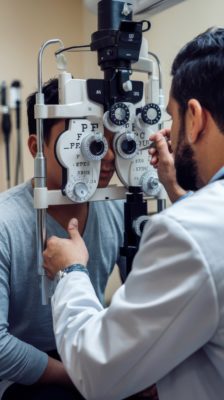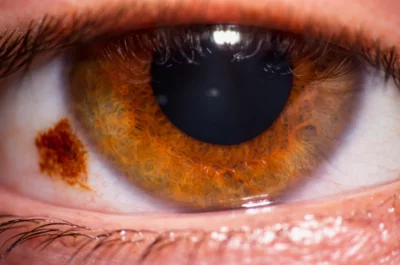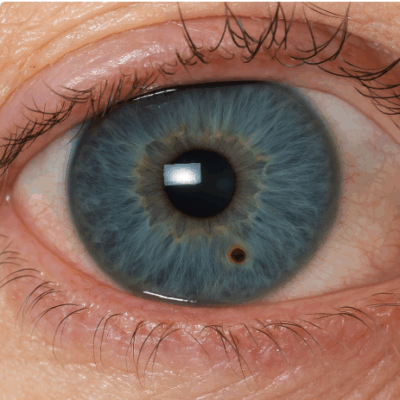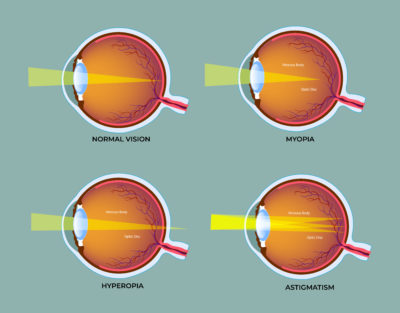Your eyesight plays a crucial role in how you interact with the world around you. 6/12 vision is a term commonly used in eye examinations to describe how clearly you can see at a distance. Simply put, 6/12 vision means that what a person with normal sight (6/6) can see from 12 metres away, you would need to stand at 6 metres to see equally clearly.
While this condition is not severe, it indicates a mild reduction in visual sharpness that may affect specific daily tasks, such as reading road signs or distant text. Understanding what 6/12 vision is, its causes, and correction options can help you maintain healthy eyesight and make informed choices about your eye care.

What Is 6/12 Vision?
The 6/12 vision is derived from the Snellen chart, a standard tool used by eye specialists to measure visual acuity. The first number, “6,” refers to the distance at which the test is performed (6 metres). The second number, “12,” represents the distance at which a person with normal vision can see the same line on the chart.
So, what is 6/12 vision in practical terms? It indicates that your visual clarity is slightly below normal. You may notice blurring when viewing objects from a distance, such as bus numbers, shop signs, or digital screens. Although it typically does not cause major limitations, prolonged strain can lead to headaches or fatigue if left uncorrected.
In refractive terms, 6/12 vision means the amount of power depends on individual factors, but it generally falls within a mild prescription range of -0.75 to -1.00 dioptres for nearsightedness.
Common Causes of 6/12 Vision
The eyesight 6/12 means that light entering the eye does not focus perfectly on the retina, often due to a refractive error. Several factors can lead to this condition, ranging from lifestyle habits to natural changes in the eye’s structure.
Refractive Errors
The most common reason for 6/12 vision is myopia (short-sightedness), where distant objects appear blurry while close ones remain clear. Astigmatism, caused by an irregularly shaped cornea, can also lead to distorted or hazy vision. In some cases, mild hyperopia (long-sightedness) contributes to difficulty focusing on nearby and distant objects.
Age and Eye Health
As you age, the lens of the eye loses flexibility, making it harder to focus on objects at varying distances. This gradual decline can make 6/12 vision more common in older adults.
Eye Fatigue and Lifestyle Factors
Extended screen use, poor lighting, or lack of visual rest can strain the eyes, temporarily reducing visual sharpness. These factors do not always cause permanent changes but can worsen existing refractive errors.
An optometrist determines the exact 6/12 vision glass power through refraction tests during an eye examination.
How 6/12 Vision Affects Your Daily Life
Although mild, distance vision 6/12 means you might not see as sharply as those with standard vision. The impact can vary depending on your daily activities, occupation, and lifestyle.
For example, reading signs while driving, watching television, or identifying faces at a distance may require extra focus. Some people adapt easily, while others experience discomfort or reduced performance when performing tasks that require precise vision. Recognising these signs early helps prevent unnecessary strain and supports better eye health management.
Can 6/12 Vision Be Corrected?
Yes, 6/12 vision can be corrected effectively in most cases. The correction method depends on the cause of the visual impairment and your personal preferences.
Common solutions include:
- Glasses: The most common and accessible way to correct 6/12 vision. Prescription lenses refocus light onto the retina for sharper clarity.
- Contact Lenses: These provide a wider field of view without the bulk of glasses, ideal for those with active lifestyles.
- Laser Vision Correction: For eligible candidates, procedures such as LASIK or SMILE can permanently correct refractive errors that cause 6/12 vision by reshaping the cornea.
If you’re wondering if 6/12 vision can be corrected permanently, the answer depends on the treatment method. Surgery offers lasting results, while glasses and lenses provide reversible correction.
Are Corrective Lenses Necessary for 6/12 Vision?
Whether you need glasses for 6/12 vision depends on the severity of your symptoms and how they affect your daily activities.
If you experience eye strain, headaches, or difficulty focusing on distant objects, corrective lenses are recommended. 6/12 vision glass power is usually mild, but even slight correction can improve comfort and clarity.
Children and students may benefit from glasses to enhance learning and concentration, while professionals who rely heavily on precise vision, such as drivers or pilots, should prioritise correction. Ultimately, an optometrist will assess your needs to decide if lenses are necessary.
How to Manage 6/12 Vision
Managing 6/12 vision goes beyond wearing corrective lenses. It also involves adopting habits that promote long-term eye health and comfort.
- Schedule Regular Eye Exams: Visit your optometrist at least once every 12-18 months to monitor changes in prescription or eye condition.
- Follow the 20-20-20 Rule: Every 20 minutes, look at something 20 feet away for 20 seconds to relieve digital eye strain.
- Eat Eye-Healthy Foods: Include leafy greens, carrots, fish, and foods rich in vitamins A, C, and E to maintain healthy vision.
- Protect Eyes from UV Rays: Wear sunglasses outdoors to prevent UV damage.
- Limit Screen Time: Reduce prolonged exposure to digital devices and ensure proper lighting to minimise glare.
- Exercise and Stay Hydrated: Good overall health supports blood circulation to the eyes, helping maintain clear vision.
With consistent care, the effects of 6/12 vision can be managed effectively, preventing further deterioration.
Conclusion
Understanding 6/12 vision empowers you to take proactive steps toward protecting your eyesight. While 6/12 vision means a mild deviation from perfect vision, it can influence your comfort and performance in everyday activities. The good news is that 6/12 vision indicates minimal power and can be easily corrected with glasses, contact lenses, or refractive surgery.
By maintaining healthy habits, attending regular check-ups, and promptly addressing vision changes, you can preserve optimal eye health. Remember, even mild visual differences deserve attention because clear vision is key to safety, confidence, and quality of life.










This article provides an excellent breakdown of 6/12 vision, making complex eye health concepts easy to understand. I appreciate how clearly the causes, correction methods, and improvement strategies are explained—it’s truly informative for anyone looking to take better care of their eyes.